Related Research Articles

Nellie Davis Ross was an American educator and politician who served as the 14th governor of Wyoming from 1925 to 1927, and as the 28th and first female director of the United States Mint from 1933 to 1953. She was the first woman to serve as governor of a U.S. state, and remains the only woman to have served as governor of Wyoming. She was a Democrat and supported Prohibition. She ran for re-election but refused to campaign herself.

The Tribes of Galway were 14 merchant families who dominated the political, commercial and social life of the city of Galway in western Ireland between the mid-13th and late 19th centuries. They were the families of Athy, Blake, Bodkin, Browne, Darcy/D’Arcy, Deane, Font, French, Joyce, Kirwan, Lynch, Martin, Morris and Skerritt. Of the 14 families, 12 were of Anglo Norman origin, while two—the Darcy and Kirwan families—were Normanised Irish Gaels.
The 2004 Irish presidential election was scheduled for Friday, 22 October 2004. However, nominations closed at noon on 1 October and the incumbent president, Mary McAleese, who had nominated herself in accordance with the provisions of the Constitution, was the only candidate nominated. Accordingly, she was re-elected for a second seven-year term of office without the need to hold an election. This was the third time a president was returned unopposed, following Seán T. O'Kelly in 1952, and Patrick Hillery in 1983. McAleese was inaugurated for her second term on Thursday, 11 November 2004.
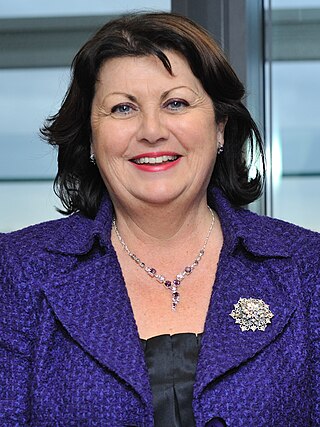
Máire Geoghegan-Quinn is an Irish former Fianna Fáil politician who served as European Commissioner for Research, Innovation and Science from 2010 to 2014, Member of the European Court of Auditors from 2000 to 2010, Minister for Equality and Law Reform from November 1994 to December 1994, Minister for Justice from 1993 to 1994, Minister for Tourism, Transport and Communications from 1992 to 1993, Minister of State at the Department of the Taoiseach from 1987 to 1989, Minister of State for Youth and Sport from March 1982 to December 1982, Minister for the Gaeltacht from 1979 to 1981, Minister of State at the Department of Industry, Commerce and Energy from 1978 to 1979 and Parliamentary Secretary to the Minister for Industry and Commerce from 1977 to 1978. She served as a Teachta Dála (TD) for the Galway West constituency from 1975 to 1997.
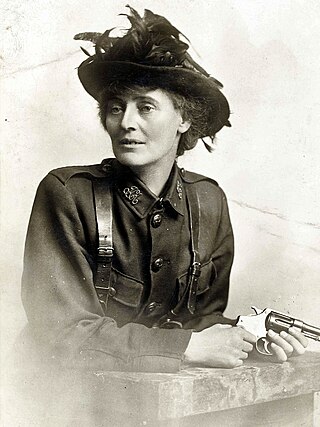
Constance Georgine Markievicz, also known as Countess Markievicz and Madame Markievicz, was an Irish politician, revolutionary, nationalist, suffragist, socialist, and the first woman elected to the Westminster Parliament. She was elected Minister for Labour in the First Dáil, becoming the second female cabinet minister in Europe. She served as a Teachta Dála for the Dublin South constituency from 1921 to 1922 and 1923 to 1927. She was a Member of Parliament (MP) for Dublin St Patrick's from 1918 to 1922.

Colonel Richard Martin, was an Irish politician and campaigner against cruelty to animals. He was known as "Humanity Dick", a nickname bestowed on him by King George IV. He succeeded in getting the pioneering Cruel Treatment of Cattle Act 1822, nicknamed 'Martin's Act', passed into British law.
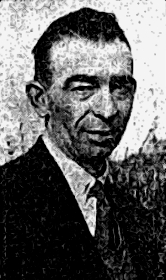
Michael Donnellan was an Irish Clann na Talmhan politician.
Mark Killilea Snr was an Irish Fianna Fáil politician. He was a Teachta Dála (TD) for constituencies in County Galway for over 30 years, and then a Senator for 8 years.
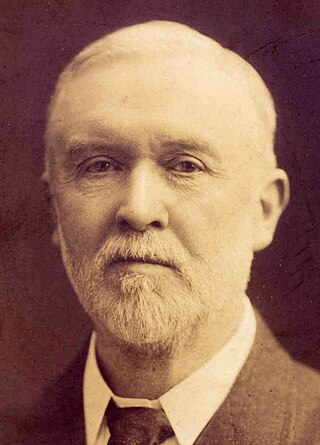
John Joseph Clancy, usually known as J. J. Clancy, was an Irish nationalist politician and Member of Parliament (MP) in the House of Commons for North Dublin from 1885 to 1918. He was one of the leaders of the later Irish Home Rule movement and promoter of the Housing of the Working Classes (Ireland) Act 1908, known as the Clancy Act. Called to the Irish Bar in 1887, he became a King's Counsel in 1906.

Helena Concannon was an Irish historian, writer, language scholar and Fianna Fáil politician.

Jane Wyse Power was an Irish activist, feminist, politician and businesswoman. She was a founder member of Sinn Féin and also of Inghinidhe na hÉireann. She rose in the ranks to become one of the most important women of the revolution. As President of Cumann na mBan, she left the radicalised party and formed a new organisation called Cumann na Saoirse, holding several senior posts in the Dáil during the Free State.
Mary Josephine Donovan O'Sullivan was professor of history at Queens College, Galway from 1914 to 1957.
Florence Moon was an Irish suffragist, born in Birmingham.
Mary Fleetwood Berry was an Irish suffragist who advocated for women's right to vote between 1900–1918. Berry was a member of the Connacht Women's Franchise League, and the wife of James Fleetwood Berry, Rector of St. Nicholas' Collegiate Church. She was an active member of the Women's National Health Association.
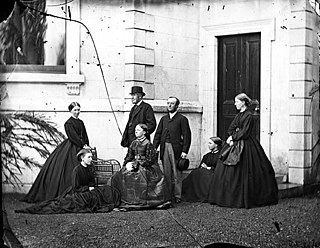
John George Barry Bingham, 5th Baron Clanmorris DL, JP, was an Irish peer.
Dudley Persse (1625–1699) was an Anglo-Irish landlord and Anglican priest.

Anna Maria Haslam was a suffragist and a major figure in the 19th and early 20th century women's movement in Ireland.

Alice Mary Cashel was an Irish nationalist, County Councillor and judge. She was a founding member, with Annie McSwiney, of the Cork Cumann na mBan.

Nun's Island Distillery was an Irish whiskey distillery which operated in Galway, Ireland, from at least 1815, and possibly as early as the late 1700s, until circa 1908.
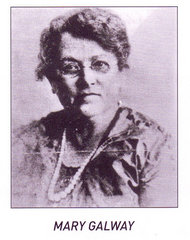
Mary Galway , was an Irish trade unionist and suffragist. She was President of the Textile Operatives Society and she and another woman were exceptionally sent to national conference fifteen years before another woman was chosen.
References
- ↑ Clancy, Mary (10 December 2018). "Sarah Persse: Pioneering woman candidate withdrew from politics before polling day". The Irish Times. Retrieved 23 May 2020.
- ↑ Clancy, Mary (1996). "The Western Outpost: Local Government and Women's Suffrage in County Galway 1898-1918". In Moran, Gerard; Gillespie, Raymond; Nolan, William (eds.). Galway History & Society: Interdisciplinary Essays on the History of an Irish County. Dublin: Geography Publications. pp. 557–587. ISBN 0906602750.